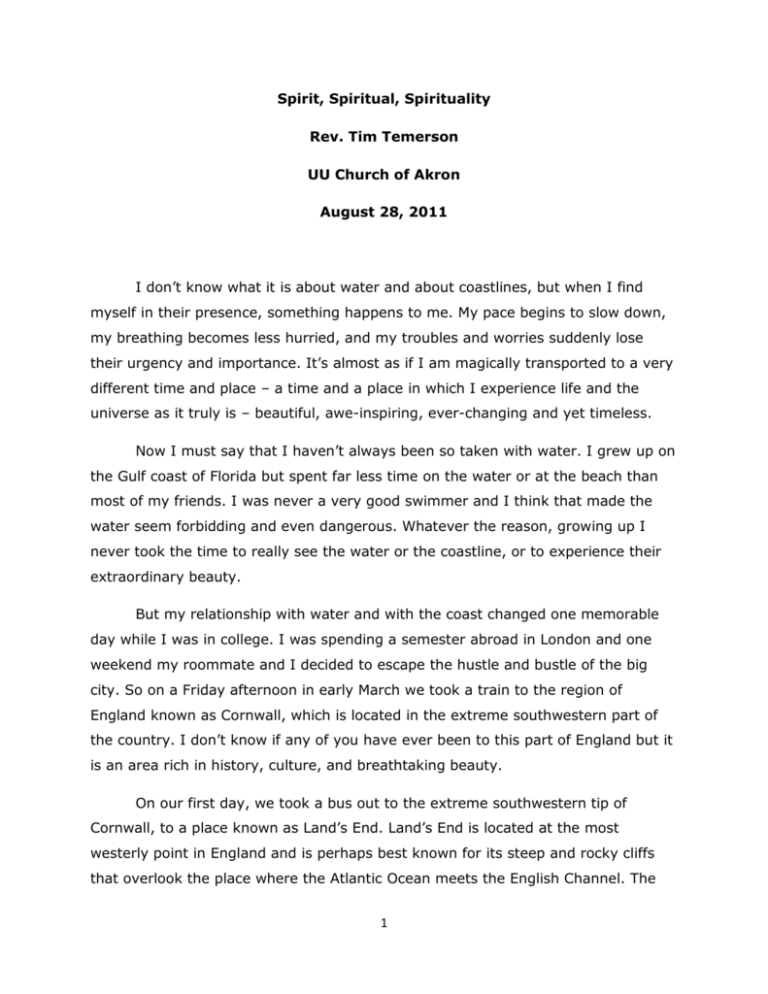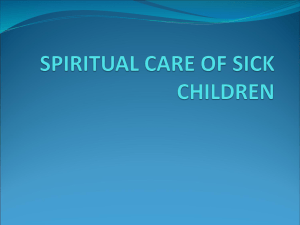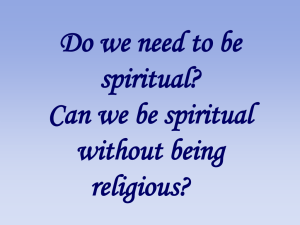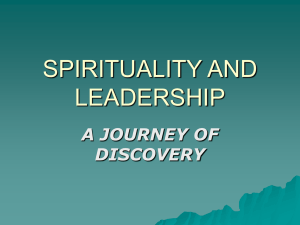Spirit, Spiritual, Spirituality - Unitarian Universalist Church of Akron
advertisement

Spirit, Spiritual, Spirituality Rev. Tim Temerson UU Church of Akron August 28, 2011 I don’t know what it is about water and about coastlines, but when I find myself in their presence, something happens to me. My pace begins to slow down, my breathing becomes less hurried, and my troubles and worries suddenly lose their urgency and importance. It’s almost as if I am magically transported to a very different time and place – a time and a place in which I experience life and the universe as it truly is – beautiful, awe-inspiring, ever-changing and yet timeless. Now I must say that I haven’t always been so taken with water. I grew up on the Gulf coast of Florida but spent far less time on the water or at the beach than most of my friends. I was never a very good swimmer and I think that made the water seem forbidding and even dangerous. Whatever the reason, growing up I never took the time to really see the water or the coastline, or to experience their extraordinary beauty. But my relationship with water and with the coast changed one memorable day while I was in college. I was spending a semester abroad in London and one weekend my roommate and I decided to escape the hustle and bustle of the big city. So on a Friday afternoon in early March we took a train to the region of England known as Cornwall, which is located in the extreme southwestern part of the country. I don’t know if any of you have ever been to this part of England but it is an area rich in history, culture, and breathtaking beauty. On our first day, we took a bus out to the extreme southwestern tip of Cornwall, to a place known as Land’s End. Land’s End is located at the most westerly point in England and is perhaps best known for its steep and rocky cliffs that overlook the place where the Atlantic Ocean meets the English Channel. The 1 photo on the cover of your order of service is of Land’s End and Warren will place that same photo in color on the screen. After our bus dropped us off, we climbed one of those cliffs and soon found ourselves enjoying one of the most spectacular views I have ever seen. The water was deep blue and the air smelled crisp and clear. The sun was bright and although it was early March, the air was warm, so warm, in fact, that we took our coats off. I remember looking out over the water and feeling as if I could see forever and like Jeffrey Lockwood’s descriptions of the grassland, my awareness was stretched by the infinity just beyond the horizon. As we stood atop that cliff marveling at the beauty all around us, we noticed off in the distance a storm cloud heading in our direction. It was relatively small, moved rapidly, and was itself surrounded by blue sky and white puffy clouds. Having grown up in Central Florida where loud thunderstorms and vivid lightening are common, I’ve always been cautious and yes I would even say afraid of approaching storms. But there was something different about this moment and this storm, something that led me to stay on that cliff and to welcome the approaching storm. And I am so glad I stayed because in a matter of a few minutes, I was engulfed in the most amazingly beautiful snow squall I have ever experienced. For only a minute or two, the sky darkened, the temperature dropped, and snow swirled around me. And then, as suddenly as the squall had appeared, it was gone, the sun returned, and I once again found myself in midst of a warm, sunny day. As I look back on that moment atop that cliff with the snow swirling in one second and then the warm sun and blue water returning in the next, all I can say with certainty is that for a brief time I was truly standing on sacred ground and experiencing something that I can only describe as divine. In that moment, I saw my life as part of something greater, as part of a universe of incomparable beauty, immense power, and great, great mystery. For the briefest of moments I experienced life not as a straight line in which I am at the center but rather as an infinite and awe-inspiring circle in which I am unique and yet interrelated, free and yet deeply connected to all that surrounds me. On that beautiful coastline, in the 2 midst of that incredible snow squall, I experienced a truth and a reality so beautiful, so powerful, and so mysterious that I have come to call it God. Now I don’t want to give you the impression that my use of the word “God” to describe what happened to me on that cliff implies that I fully understand my experience or that I have figured out the meaning of existence. Far from it. Looking back on that moment and others that I have had since then, the phrase that best describes my core theological conclusion about ultimate reality is “aweinspiring mystery.” But there is one thing I can say for certain about all my experiences of that awe-inspiring mystery. From the moment I was enveloped in that snow squall right up to the present, those moments of awe, of beauty, and of mystery have, without a doubt, been deeply, deeply spiritual. Now, of all the terms and concepts that we encounter in religious life, “spiritual” and “spirituality” are unquestionably the most confusing and I think misunderstood. They are used in so many contexts and in so many different ways that it is hard to have a grasp on what they truly mean. Think for a moment about that very common use of word spiritual by those who dislike organized religion as in “I’m spiritual but not religious.” And then there are some who reject any use of the words spiritual or spirituality because they are equated with belief, suggesting that being spiritual means having a firm belief in a God who stands over the universe pulling levers like the Wizard of Oz. As you can probably tell, I have a very different understanding of spirituality. You see, when I reflect back on those moments of deep connection in my own life, it is clear to me that what mattered most is not what I believed but rather what I experienced. When I stood on that cliff in the snow squall, I didn’t have the first clue about what I believed about God or religion or much of anything else for that matter. And that was ok because that moment was about experience and connection, not doctrine or dogma. Above all else, being spiritual is about experiencing a deep connection to something greater than ourselves – something that leads to a place of peace, of awe, of mystery, and of an incredible sense of oneness with all of existence. 3 In trying to understand what it means to be spiritual, it is useful to remember that the word “spirit” is derived from the ancient Hebrew word, ruah, which literally means breath or wind. In the Hebrew Bible, ruah or spirit is the breath or essence of life. It is the life force, the energy, the rhythm, the pulse of creation. It is the wind that stirred the primordial waters on the creation morning and it is that same wind, that same breath that fills our lives and caresses our cheeks in those moments of awe and wonder. So to be spiritual is to experience and to be one with that essence. It is to slow down, to be present, and to inhale the breath of life. In fact, the original meaning of the word inspiration is to breath in the essence or the spirit of life. And if being spiritual is ultimately about experience and not belief, then spirituality is everything that enables one to experience, to be inspired, to breathe in the essence of life. Spirituality has nothing to do with what you believe; it’s about being open to those moments of deep connection and intentional about cultivating them. I must say that when someone tells me that they don’t believe in spirituality or spiritual growth because they are an atheist, an agnostic, or a humanist, I think to myself that those things have little to do with experiencing awe at a beautiful sunrise or deep connection and oneness while singing a moving hymn in church. Spirituality is about experiencing awe and deep connection, not about believing in a supernatural being. At the same time, spiritual growth has nothing to do with moving toward a particular belief or doctrine. Rather it is about cultivating and greater openness and deeper awareness of the beauty, the blessing, and the mystery of life. And it is that need for openness that, in my view, makes Unitarian Universalism such a deeply spiritual religious tradition. We encourage and celebrate the kind of openness and intentionality that makes spirituality and deep connection possible. And rather than telling you what your experiences mean or trying to force them into a single theological framework, we seek to challenge and inspire you to cultivate those experiences, to find meaning in them, and then to integrate those experiences and those meanings into your life and into the life of this congregation. 4 Before leaving you this morning I want to say a brief word about the relationship between religion and spirituality. You see, I think it’s easy to make the assumption that spirituality is something we do and experience on our own and by ourselves. Earlier I told you a story about a very solitary experience I had on top of a cliff that enabled to me to catch a glimpse of eternity. But I want to make clear that the paths to spiritual depth and connection do not necessarily lead to a cliff overlooking the ocean. They are found in every moment, in our daily lives, and especially in community and in relationship. After the service you are invited to participate in a brief experience of one of our most important and meaningful spiritual growth programs - Small Group Ministry or SGM and I strongly encourage all who are looking to build connections and to deepen their spiritual lives to participate in that experience. Before becoming a minister, I was a member of SGM for a number of years and I can honestly say that it changed my life. As I journeyed alongside the members of my group – listening and being heard, caring and being cared for – I experienced a depth of connection and beauty that I had not thought possible. I learned that the spirit moves in and among our connections to one another and I experienced moments of love and depth that took me to a place that I only thought existed atop a Cliffside in England. Friends, how you choose to experience deep connection and to cultivate your spiritual life is ultimately up to you. Unitarian Universalism does not insist that you follow one method or one practice, or any method or practice at all. But we do seek and we do hope that you will choose to live your life with intention, with purpose, and with openness to the beauty, the mystery, and the possibilities of life. For if we are open to those moments of deep connection, the breath of life will flow through our lives and bring meaning and hope to ourselves, to each other, and to the world. Thank you for listening and blessed be. 5





